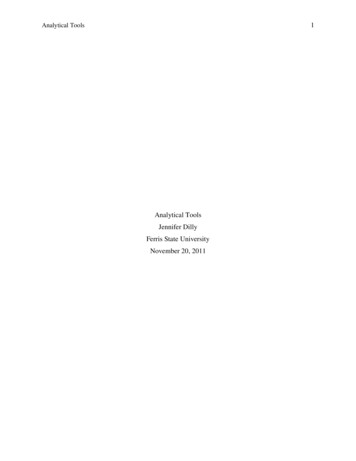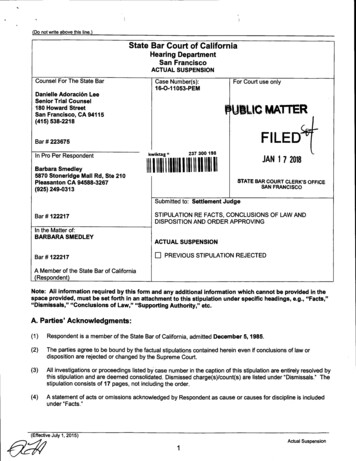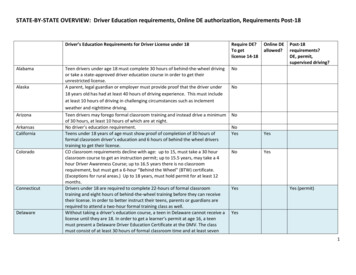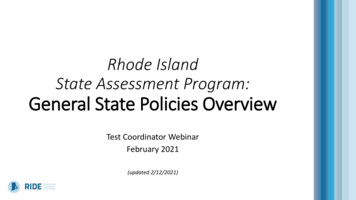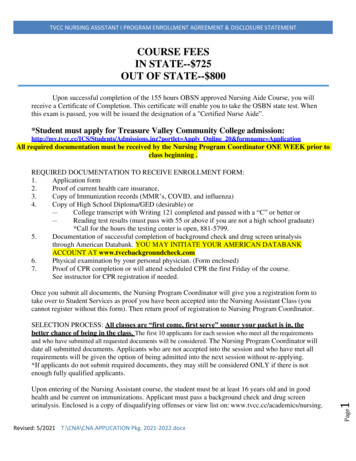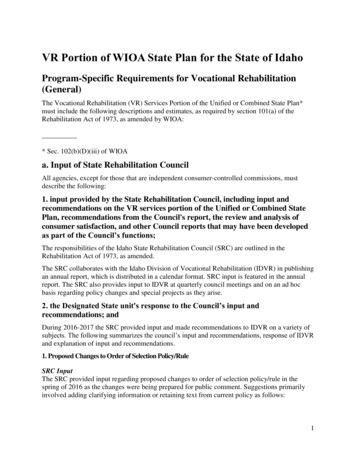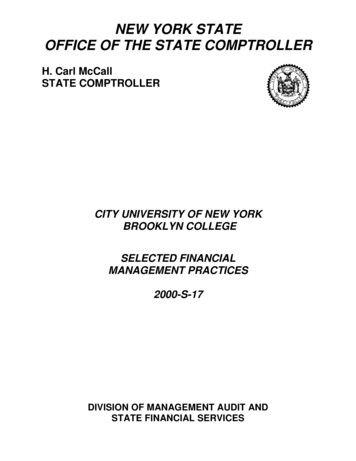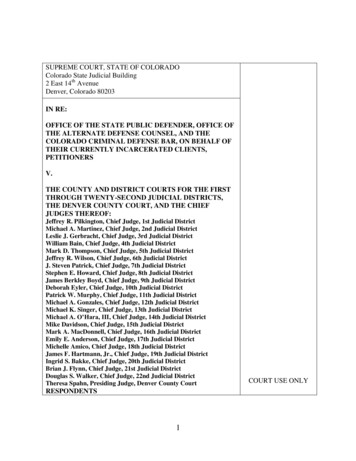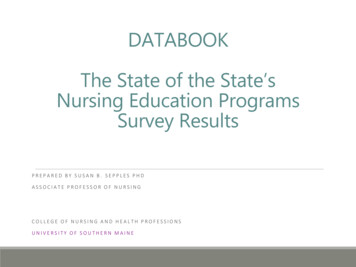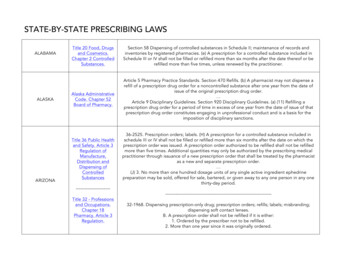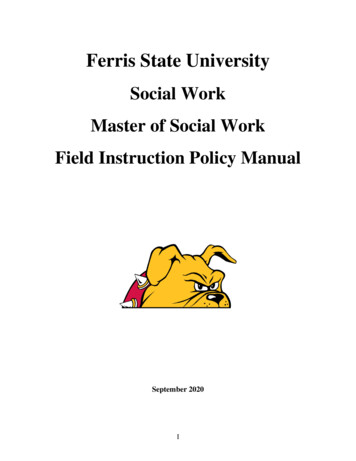
Transcription
Ferris State UniversitySocial WorkMaster of Social WorkField Instruction Policy ManualSeptember 2020I
CONTACT INFORMATIONField Director, Main CampusDana Holcomb, LMSW, DSW CandidateASC 2092231-591-2763DanaHolcomb@ferris.eduField Director, Northern RegionJoanie Hazelton, LMSWUniversity Center, Traverse City CampusFSU Social Work Office231-995-1715JoanieHazelton@ferris.eduMSW Program DirectorDr. Janet Vizina-Roubal, LMSW, DSWASC 2094231-357-2817JanetVizinaRoubal@ferris.eduSocial Work Department ChairDr. Michael Berghoef, PhDASC 2108231-591-2737MichaelBerghoef@ferris.edu1
TABLE OF CONTENTSINTRODUCTION . 3MISSION STATEMENT, GOALS, AND PRACTICE COMPETENCIES . 4DESCRIPTION OF FIELD PLACEMENTS . 11ROLE DESCRIPTIONS AND RESPONSIBILIES . 11THE FIELD DIRECTOR . 11THE AGENCY BASED FIELD INSTRUCTOR . 12THE FIELD LIAISON/FIELD SEMINAR INSTRUCTOR . 13THE STUDENT . 14ELIGIBILITY FOR THE FIELD . 14AGENCY SELECTION CRITERIA . 15RIGHTS AND RESPONSIBILIES OF FIELD AGENCIES . 16FIELD INSTRUCTOR CRITERIA . 16STUDENT PLACEMENT PROCEDURES . 17BACKGROUND CHECKS, FELONY CONVICTIONS, AND DRUG TESTING . 17COVID-19 POLICIES .17-18FIELD PLACEMENTS AT THE STUDENT’S PLACE OF EMPLOYMENT . 18LEARNING AGREEMENT POLICY AND GUIDELINES . 18INTERN PLACEMENT TRACKING SYSTEM .18-19EVALUATION OF FIELD PLACEMENT PERFORMANCE POLICY . 19-20SERVICE CONTINUITY POLICY . 20INSURANCE/COVERAGE . 20TECHNOLOGY/SOCIAL MEDIA USE POLICY 21PROBLEMS IN PLACEMENT AND PROBLEM-SOLVING PROCEDURES . 21-23FIELD INTEGRATIVE SEMINAR . 23POLICY FOR RESEARCH INVOLVING HUMAN SUBJECTS . 23PERSONAL SAFETY . 23-24CONFIDENTIALITY POLICY . 24FERRIS STATE UNIVERSITY HARASSMENT POLICY . 24-25DUAL RELATIONSHIP POLICY . 26NASW CODE OF ETHICS AND MEMBERSHIP IN NASW . 272
INTRODUCTIONThe purpose of this field manual is to outline the policies, procedures, roles and responsibilities thatgovern the field education for students in the Ferris State University’s Masters of Social Work Program.This manual is intended for student’s field instructors, field agencies, faculty and advising board membersand administrators. The MSW Field Instruction Manual is meant to be a guideline and reminder of the"learning relationship" among students, field instructors and social work faculty.These policies have been established in an effort to guide each participant in the accomplishment of thefield objectives of social work education.Field Instruction is the direct practice portion of social work education, and the program's "signaturepedagogy". It is an educationally directed, coordinated and monitored field experience required of allsocial work students. Each student is expected to progressively build upon his/her knowledge and skillsfrom one semester to the next. In the field students are to demonstrate knowledge values and skills inreal life situations under the supervised instruction in accordance with their individualized learning plans.Field is where the student is expected to put into practice all they have learned in the classroom - humanbehavior, policy, research, practice, ethics, multicultural diversity, special populations and social andeconomic justice.Classroom learning and theoretical content are integrated with the focus on generalist practice in thefoundation year and clinical practice in the advanced year and advanced standing. In an effort to continuethe integration of field and classroom, all students will be required to attend a field seminar whichprovides continued educational and administrative support for the learning environment. The fieldseminar is integrated into the field education course and accounts for 10 hours during the requirednumber of field education hours. The field liaison for each student is also the field seminar instructor. Thefield seminar meets approximately three times per semester as agreed upon by the field liaison and thestudents assigned to that section.3
Social Work ProgramFerris State UniversityMission Statement, Goals and Practice CompetenciesFSU MSW Program MissionThe mission of the Ferris State University Master of Social Work Program is to educate professional socialworkers to be leaders in their field, promoting social and economic justice, diversity, and empowermentand addressing oppressive social conditions. Graduates will exemplify the Ferris State University CoreValues of Collaboration, Diversity, Ethical Community, Excellence, Learning and Opportunity. Graduateswill be critical thinkers, able to meet the challenges of a global society through lifelong learning,innovation, political engagement, service and community collaboration.FSU MSW Program Goals1.Prepare social workers with the knowledge, skills and values to be advanced social workpractitioners with individuals, groups and families, toward the enhancement of social interactionand human functioning.2. Prepare social workers to practice without prejudice or discrimination towards thosemarginalized populations in the global community with respect to social work values andstandards. Promote and be an advocate for social diversity.3. Prepare social workers to engage in activities that promote collaboration and lifelong learningtoward the effective performance of personal and professional responsibilities.4. Prepare social workers with state of the art evidenced based clinical practice skills to assistpeople in healing trauma, while finding additional social/political solutions to meet their life goals.FSU MSW Educational PhilosophyThe Ferris State University Mission states that our university:“ prepares students for successful careers, responsible citizenship, and lifelong learning. Through its manypartnerships and its career-oriented, broad-based education, Ferris serves our rapidly changing globaleconomy and society.”We are fortunate that our Founder Woodbridge N. Ferris, who once said ““The highest work is that ofsocial work”, set a course for our university that resulted in a mission so consonant with our social workprogram. Likewise, we embrace and promote the Ferris State University Core Values of Collaboration,Diversity, Ethical Community, Excellence, Learning and Opportunity, which are consistent with those ofour program and our profession. These core values are in harmony with our professional values and areinfused and highlighted in our collaborative efforts with others across the university as we strive to livethem out and encourage our students to put them into practice as well.The Ferris State University Vision also echoes the educational vision of the social work program when itstates that we will be “the recognized leader in integrative education, where theory meets practicethroughout the curriculum, and where multi-disciplinary skills important in a global economy aredeveloped with the result that Ferris State University will also be:4
“The preferred choice for students who seek specialized, innovative, career- and life-enhancingeducation;The premier educational partner for government, communities, agencies, businesses, andindustries through applied research and joint ventures;A stimulating, student-centered academic environment that fosters life-long engagement,leadership, citizenship, and continuing intellectual development;A university that aligns its practices and resources in support of its core values of collaboration,diversity, ethical community, excellence, learning, and opportunity.”(Ferris State University, esident/vision.htm)This vision is embedded in our curriculum and its realization will be evident in the practice of ourgraduates who will emerge as leaders and lifelong learners active in their communities on multiple levels.Council on Social Work Education (CSWE)The Council on Social Work Education has identified 9 Competencies in its Educational Policy andAccreditation Standards that all professional social workers should be able to demonstrate. Thesecompetencies are woven into our curriculum and our assessment of student learning.These competencies are that each of our students will:1. Demonstrate ethical and professional behavior.2. Engage diversity and difference in practice.3. Advance human rights and social, economic, and environmental justice.4. Engage in practice- informed research and research- informed practice.5. Engage in policy practice.6. Engage with individuals, families, groups, organizations, and communities.7. Assess individuals, families, groups, organizations, and communities.8. Intervene with individuals, families, groups, organizations, and communities.9. Evaluate practice with individuals, families, groups, organizations, and communities.(CSWE Commission on Accreditation, 2015. licies/2015-EPAS )National Association of Social Workers (NASW)As members of the National Association of Social Workers, we list in our code of ethics the specific Valuesand Ethical Principles to which we as a profession aspire.They are the values of; Service and the accompanying Ethical Principle that Social workers’ primary goal is to help peoplein need and to address social problems. Social Justice and the accompanying Ethical Principle that Social workers challenge socialinjustice. Dignity and Worth of the Person and the accompanying Ethical Principle that Social workersrespect the inherent dignity and worth of the person. Importance of Human Relationships and the accompanying Ethical Principle that Social workersrecognize the central importance of human relationships. Integrity and the accompanying Ethical Principle that Social workers behave in a trustworthymanner. Competence and the accompanying Ethical Principle that Social workers practice within theirareas of competence and develop and enhance their professional expertise.5
(NASW Code of Ethics, 1996, revised in sp)Our faculty are learner focused and recognize, value and are committed to our non-traditional studentswho bring a wealth of life experience to their studies. We endeavor to develop transformational leadersthrough teaching and modeling as we recognize that many of our graduates will return to or assumeleadership roles in their organizations and communities. We judiciously use traditional and innovativetherapeutic techniques, recognizing their importance and potential in education and in social workpractice. We recognize the importance of addressing specific life issues such as the effects of trauma,substance abuse, mental health and aging and foster a lifespan perspective. Our commitment is tograduate competent practitioners with the expertise and motivation to tackle many of our society’s mostchallenging problems, as our founder Woodbridge N. Ferris stated: “to make the world a better place.”Program Practice Competencies and Learning Outcomes***NOTE: ADVANCED PRACTICE BEHAVIORS ARE IDENTIFIED IN BOLD AND ITLICIZEDPractice Competency #1: Demonstrate Ethical and Professional BehaviorSocial Workers understand the value base of the profession and its ethical standards as well as relevantlaws and regulations that may impact practice at the micro, mezzo, and macro levels. Social Workersunderstand frameworks of ethical decision-making and how to apply principles of critical thinking tothose frameworks in practice, research, and policy arenas. Social Workers recognize personal values andthe distinction between personal and professional values. They also understand how their personalexperiences and affective reactions influence their professional judgment and behavior. Social Workersunderstand the professions history, its mission and the roles and responsibilities of the profession. SocialWorkers recognize the importance of life-long learning and are committed to continually updating theirskills to ensure they are relevant and effective. Social Workers also understand emerging forms oftechnology and the ethical use of technology in social work practice.Social Workers:1. Make ethical decisions by applying the standards of the NASW Code of Ethics, relevant lawsand regulations, models for ethical decision-making, ethical conduct of research, and additionalcodes of ethics as appropriate to context;2. Use reflection and self-regulation to manage personal values and maintain professionalism inpractice situations;3. Demonstrate professional demeanor in behavior; appearance; and oral, written, and electroniccommunication;4. Use technology ethically and appropriately to facilitate practice outcomes;5. Use supervision and consultation to guide professional judgment and behavior, with emphasis onsecondary traumatic stress and trauma triggers;6. Understand and identify professional strengths, limitations and challenges;7. Tolerate ambiguity in resolving conflicts and Apply ethical decision-making skills to issues specific toclinical social work;8. Identify and use knowledge of relationship dynamics, including power differentials; and9. Recognize and manage personal biases as they affect the therapeutic relationship in the service ofclients’ well-being.6
Practice Competency #2: Engage Diversity and Difference in PracticeSocial Workers understand how diversity and difference characterize and shape the human experienceand are critical to the formation of identity. The dimensions of diversity are understood as theintersectionality of multiple factors including but not limited to age, class, color, culture, disability andability, ethnicity, gender, gender identity and expression, immigration status, marital status, politicalideology, race, religions/spirituality, sex, sexual orientation, and tribal sovereign status. Social Workersunderstand that, as a consequence of difference, a person’s life experiences may include oppression,poverty, marginalization, and alienation as well as privilege, power, and acclaim. Social Workers alsounderstand the forms and mechanisms of oppression and discrimination and recognize the extent towhich a culture’s structures and values, including social, economic, political, and cultural exclusions, mayoppress, marginalize, alienate, or create privilege and power.Social Workers:1. Apply and communicate understanding of the importance of diversity and difference in shaping lifeexperiences in practice at the micro, mezzo, and macro levels;2. Present themselves as learners and engage clients and constituencies as experts of their ownexperiences;3. Apply self-awareness and self-regulation to manage the influence of personal biases and values inworking with diverse clients and constituencies;4. Research and apply knowledge of diverse populations to enhance client well-being and work effectivelywith diverse populations;5. Identify and use practitioner/client differences from a strengths and trauma informed perspective; and6. Demonstrate knowledge of historical trauma and its impact on diverse populations.Practice Competency #3: Advance Human Rights and Social, Economic, and Environmental Justice.Social Workers understand that every person regardless of position in society has fundamental humanrights such as freedom, safety, privacy, and adequate standard of living, health care, and education. SocialWorkers understand the global interconnections of oppression and human rights violations, and areknowledgeable about theories of human need and social justice and strategies to promote social andeconomic justice and human rights. Social Workers understand strategies designed to eliminateoppressive structural barriers to ensure that social goods, rights, and responsibilities are distributedequitably and that civil, political, environmental, economic, social, and cultural human rights areprotected.Social Workers:1. Apply their understanding of social, economic, and environmental justice to advocate for human rightsat the individual and system levels;2. Engage in practices that advance social, economic, and environmental justice; and3. Apply their understanding of social, economic, and environmental justice to advocate for human rightsat the individual and/or system levels.4. Use knowledge of the effects of oppression, discrimination, and historical trauma on client and clientsystems to guide engagement, assessment, intervention, and/or termination.7
Practice Competency #4: Engage in Practice- informed Research and Research- informed Practice.Social Workers understand quantitative and qualitative research methods and their respective roles inadvancing a science of social work and in evaluating their practice. Social Workers know the principles oflogic, scientific inquiry, and culturally informed and ethical approaches to building knowledge. SocialWorkers understand that evidence that informs proactive derives from multi-disciplinary sources andmultiple ways of knowing. They also understand the processes for translating research findings intoeffective practice.Social Workers:1. Use practice experience and theory to inform scientific inquiry and research;2. Apply critical thinking to engage in analysis of quantitative and qualitative research methods andresearch findings;3. Use and translate research evidence to inform and improve practice, policy and service delivery; and4. Use evidence-based practice process in clinical assessment and intervention with clients.5. Participate in the generation of new clinical knowledge with respect to trauma through research andpractice.6. Use research methodology to evaluate clinical practice effectiveness and/or outcomes.Practice Competency #5: Engage in Policy Practice.Social Workers understand that human rights and social justice, as well as social welfare and services, aremediated by policy and its implementation at the federal, state, and local levels. Social Workersunderstand the history and current structures of social policies and services, the role of policy in servicedelivery, and the role of practice in policy development. Social Workers understand their role in pol
Jan 11, 2021 · FSU MSW Program Goals 1. Prepare social workers with the knowledge, skills and values to be advanced social work practitioners with individuals, groups and families, toward the enhancement of social interaction and human functioning. 2. Prepare social workers to practice without prejudice or discrimination towards those
